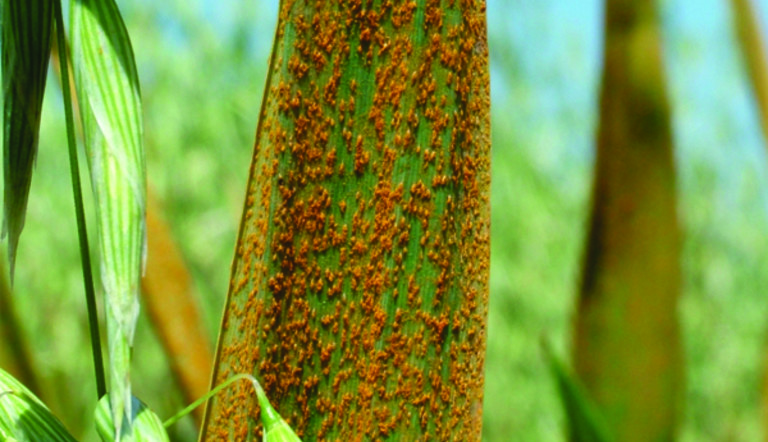
Pest Profile: Crown Rust
The disease damages oat leaves, and the higher up the damage occurs on a plant, the greater potential impact crown rust can have on yield. Crown rust reduces grain quality, reduces a plant’s stress tolerance and can cause up to 40% yield losses in oats. Because spores are spread by wind, it’s important to grow less-susceptible varieties whenever possible and scout often, as a field without a previous history of crown rust can be infected if conditions are right.

IDENTIFICATION
Crown rust is easily identified by the bright orange pustules it produces on both sides of infected leaves. The small, scattered and oval-shaped pustules develop first on the leaves, but can also spread to leaf sheaths, stems and panicles.
CONTROL TIPS
- If practical, plant susceptible crops earlier in the season, so that they’re advanced enough to survive infection without significant loss.
- Plant rust-resistant oat varieties.
- Scout early and often. Fungicides for crown rust are protective in nature and must be applied before infection progresses too far for best results.
- Apply an approved foliar fungicide as a protective measure. It’s recommended to spray at flag leaf emergence, as once crown rust has reached the flag leaf, fungicide will be ineffective. If the flag leaf is covered with spots, it’s too late to apply.
REGISTERED FUNGICIDES
Please read each label to determine which fungicide is appropriate for the crop affected.
REFERENCES AND ADDITIONAL READING
https://www.topcropmanager.com/diseases/controlling-oat-crown-rust-19016
“Crown Rust of Oat.” Saskatchewan Agriculture Knowledge Centre. Online. https://bit.ly/2IA0LKp
“Crown Rust of Oats.” Integrated Pest Management, Illinois.edu. Online. http://ipm.illinois.edu/diseases/series100/rpd109/
King, Carolyn. “Controlling Oat Crown Rust.” Top Crop Manager. 24 May 2016. Online. https://bit.ly/2KsU8i6
“Oat Grower Manual: Disease Management.” Prairie Oat Growers Association. Online. https://poga.ca/grower-manual/disease-management